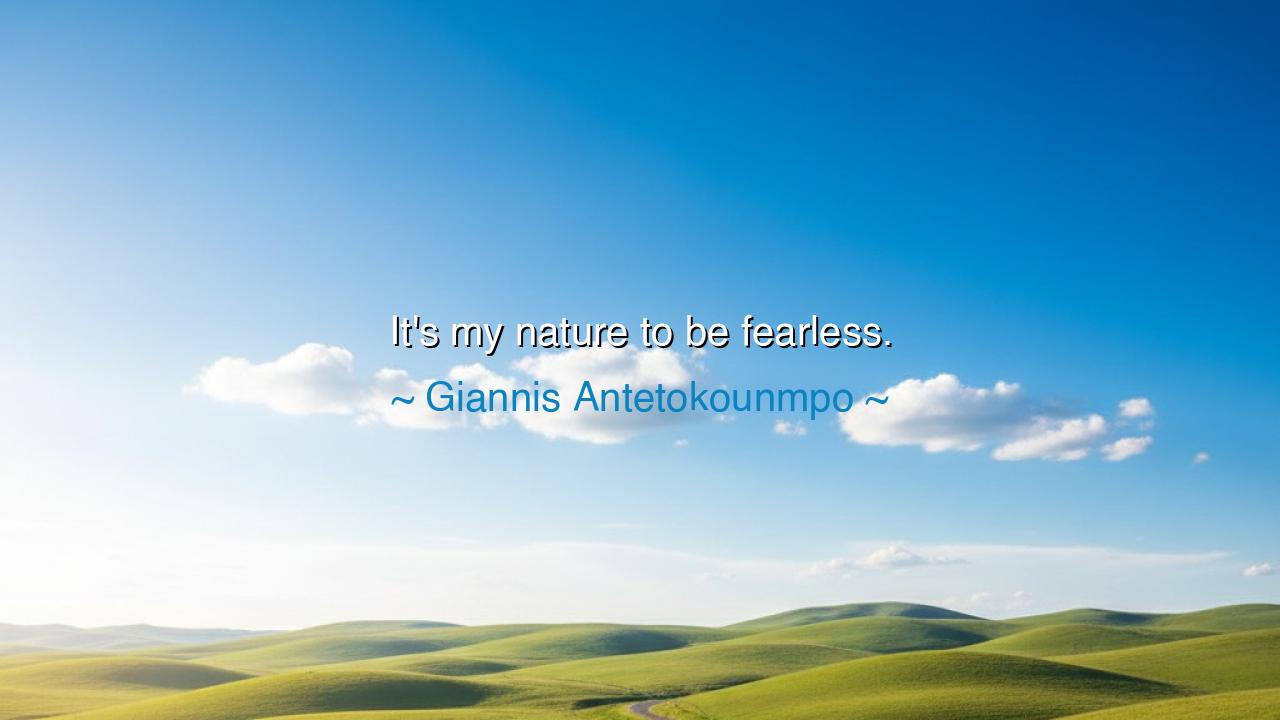
It's my nature to be fearless.






In the bold declaration of Giannis Antetokounmpo, we hear the cry of a warrior-soul: “It’s my nature to be fearless.” These words are more than the boast of an athlete—they are a revelation of character, a statement forged in hardship, perseverance, and unyielding will. To claim fearlessness as one’s very nature is to say that courage is not a mask worn in certain moments, but the marrow of the spirit, an essence that guides every step into the unknown.
To understand these words, one must recall Giannis’s origins. Born to Nigerian immigrants in Athens, he grew up amidst poverty, hardship, and the struggles of being an outsider. He and his brothers sold trinkets on the streets to survive. Yet from those trials, he forged a mind unbroken, a will unbent. When he says it is his nature to be fearless, he is not speaking only of the basketball court, but of life itself—of facing hunger without despair, of chasing dreams when the odds are stacked against him, of leaping into the unknown and refusing to retreat.
Fearlessness, in this sense, is not the absence of fear, but the mastery of it. The ancient Greeks, whose land gave Giannis his upbringing, called this thrasos—the daring courage that pushes men beyond their limits. History remembers those who embodied it: Alexander the Great, who as a youth tamed Bucephalus when others fled, revealing a courage that would carry him to conquer nations; or Harriet Tubman, who risked her life countless times to guide others to freedom, undaunted by the threat of chains or death. In each, as in Giannis, fearlessness was not a momentary decision but a constant way of being.
The meaning of his words is thus deeply motivational: we are not merely what circumstances make us; we are what our nature chooses to be. One may be born into hardship, but if fearlessness becomes your guiding essence, you cannot be stopped. This is the secret of Giannis’s rise from obscurity in Greece to the pinnacle of the NBA: he refused to let fear of failure define him. He embraced risk, endured pain, and faced challenges as though they were fuel for growth.
Yet his declaration carries also a warning and a challenge. To be fearless by nature is to live a life of boldness, but it also demands discipline. Courage without wisdom becomes recklessness, and boldness without humility becomes arrogance. The fearless spirit must therefore be guided by purpose and grounded in self-knowledge. Giannis’s story teaches us that true fearlessness is not reckless bravado, but the disciplined refusal to surrender in the face of obstacles.
The lesson for us is clear: cultivate within yourself a spirit that does not bow before fear. Life will confront you with uncertainty, with pain, with voices telling you that you cannot succeed. In those moments, remember that fear is not the enemy—surrender is. Let courage become your nature, as natural to you as breathing, so that when trials come, your first instinct is not to hide, but to rise.
In practice, this means facing discomfort willingly. It means daring to take steps that intimidate you—whether in work, relationships, or personal growth. Train yourself daily in small acts of courage, so that when the great trials come, you will not falter. Look to role models, as Giannis looked to his family and heritage, and let their strength feed your own. Above all, remember that greatness is not built in moments of ease, but in moments when fear would have ruled another, but you choose to stand.
Thus, Giannis Antetokounmpo’s words ring like the declaration of an ancient warrior: “It is my nature to be fearless.” Let them remind us that courage is not something we wait to feel—it is something we become. And when it becomes our nature, no obstacle, no hardship, no enemy can break us, for we will already have claimed the most important victory: mastery over fear itself.






AAdministratorAdministrator
Welcome, honored guests. Please leave a comment, we will respond soon